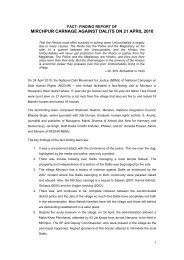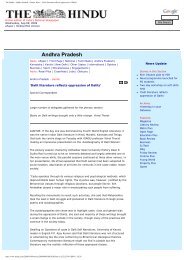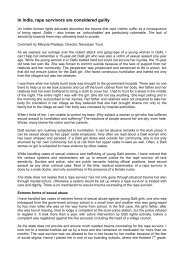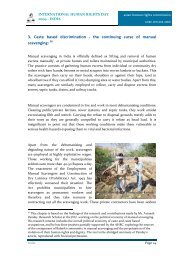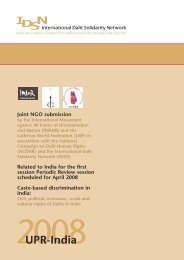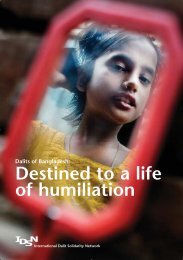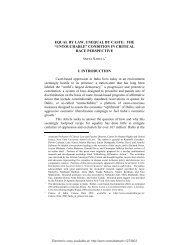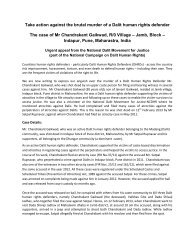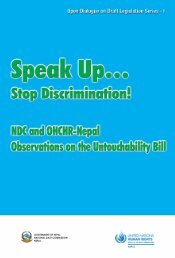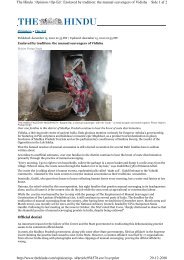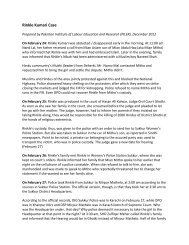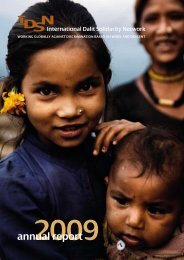GLOBAL ACTION TO COMBAT FORCED LABOURBox 3.4.Microfinance and bonded labourMicrofinance can be important both for reducing the dependence of workers on wage advances from theiremployers, and for effective rehabilitation of released bonded labourers.PEBLISA is collaborating with local microfinance institutions (MFIs) to test a range of financial servicesspecially tailored to the needs of households at heightened risk of falling into debt bondage. Such familiesneed financial services to smooth income and expenses, to manage risks, and possibly to pay for socialobligations – in essence, removing the need for employer credit.Experience indicates the need for four core financial services, with the emphasis on savings mobilizationrather than credit, at least in the first instance:(1) “Contractual” savings: The project emphasizes savings and asset building to create a buffer for thehousehold to fall back on in times of emergency. Clients “contract” to save a fi xed amount of money,however small, on a regular basis. They are meanwhile assisted with household financial planning, soas to produce a lump sum of money for a specifi c purpose, such as house construction, school fees orreligious ceremonies.(2) Liquid savings: Families vulnerable to bondage need a safe place to store small amounts of surplus cash,where it is accessible in times of need, but not so accessible that the temptation to spend is hard toresist. In some cases, savings are deposited weekly or fortnightly during group meetings. But in others,where pressures to spend are the highest, clients are provided with lockboxes that are kept at home sothey can save on a daily basis; accumulated savings are then deposited at the group meeting.(3) Income-generating loans: Innovative approaches to credit for income-generating activities aim carefullyto avoid putting clients in a potentially worse situation through increasing their debt. The project isexperimenting with very small loans; penalty-free repayment holidays; tailoring repayment schedules tothe household’s expected cash fl ow; and allowing each borrower in a group to have individual customizedloan amounts and terms, or no loan at all if they so wish.(4) Emergency loans: These are sometimes given in parallel with an income-generating loan. The projectstrives to cultivate an approach to repayment discipline in which the carrot greatly outweighs the stick,with plenty of second chances given, as long as the problem clearly stems from an inability rather thanan unwillingness to repay.Alongside the core financial services, the project also provides necessary supporting services such ashousehold financial planning to identify sources of high expenditures (dowries, religious ceremonies, alcohol)and financial education; awareness raising on the legality of employer and moneylender loans;community mobilization to cut down on unsustainable expenditures; and skills training to start or expandincome-generating activities. Other services being tested include micro-insurance, debt consolidation loansand land leasing.366. In Pakistan, field-based work has focused onthe rehabilitation of released or escaped bonded harifamilies living in seven temporary camps in and aroundHyderabad in Sindh Province. Complementary workin Sindh Province aims to reinforce implementation ofthe Bonded <strong>Labour</strong> System (Abolition) Act. With ILOsupport, the Human Rights Commission of Pakistanhas, for example, produced a booklet on the abolitionof bonded labour for use in training VigilanceCommittees; conducted a series of stakeholder workshopson the role of Vigilance Committees; and setup a pilot legal aid service for bonded haris seekingrelief through the courts.367. In Nepal, the Sustainable Elimination ofBonded <strong>Labour</strong> (SEBL) project is helping some14,000 former kamaiya families to build new secureand stable livelihoods, following the legal abolitionof the system. For most, this is based on wage labouror tenant agriculture, supplemented by earningsfrom micro-enterprise. The project targets bothadults and children in the five districts of the Terai regionwhere the kamaiya system prevailed. For adults,organizing workers through established trade unionsand educating them on their rights has been a centralproject component. This is accompanied by efforts topromote and monitor implementation of minimumwages and other labour standards, and to organizecommunity-based vigilance committees to guardagainst relapse into bonded labour, child labour andother labour exploitation. Vocational training coupledwith microfinance services aims to help familiesincrease, diversify and stabilize their income, throughactivities such as off-season vegetable growing, beekeepingand small animal husbandry. An innovativepilot micro-health insurance programme is testinggroup-based schemes adapted to the poorest households.School-age children are either being enrolledinto mainstream schools or receiving non-formal79
A GLOBAL ALLIANCE AGAINST FORCED LABOUReducation as a bridging measure, depending on theirage and situation. Some material support is also beingprovided to upgrade the quality of schools. Specialefforts enable the reintegration of kamalharis – girlswho were bonded into domestic service – back intotheir families and communities.368. Despite the unstable political situation inNepal, project partners have been able to adapt theirstrategy and make significant progress on manyfronts. For example, the project reports that 45 percent of adult former kamaiyas are now registered tradeunion members; 80 per cent of agricultural labourersin project districts (both women and men) are paidat least the minimum wage; the literacy rate has increasedfrom 38 to 55 per cent, significantly higherthan the national average; nearly 11,000 children, halfof them girls, have been mainstreamed into formalschools and provided with uniforms and books; andover 1,200 people have benefited from skills training,21 per cent of them women. PEBLISA is now providingmicrofinance expertise across the project area.As the project draws to a close in mid-2005, particularemphasis is being placed on ensuring sustainability ofimpact through the ongoing work of local partners.369. In Bangladesh, there is as yet no official recognitionof bonded labour. The project has thereforefocused on over-indebtedness in selected sectors.Research has provided evidence of bonded labourof girls in commercial sexual exploitation, and oflabour exploitation linked to over-indebtedness inthe weaving sector. Local microfinance institutionsare testing design and delivery of appropriate microfinancefor these vulnerable groups, such as a dailysavings collection service and emergency loans. Mostof the women had never previously participated in acollective activity and had been bypassed by mainstreamMFIs, such as Grameen Bank, because theyrepresented a credit risk.What have we learned throughILO technical cooperation?370. Important lessons on combating forced labourhave emerged through this intensive ILO experience.Indeed, both the Office and ILO constituents havebeen climbing, together, a steep learning curve overthe period. Much of this work has been exploratoryin nature, and often conducted on a pilot scale. Onsuch a sensitive issue as forced labour, it is essential toproceed with caution if all partners are to be kept onboard and due regard is to be given to the victims offorced labour themselves.371. Experience demonstrates clearly that nationalstakeholders must be actively engaged andinformed at every stage of the design, implementationand monitoring of ILO technical assistanceagainst forced labour. Such assistance must be embeddedfi rmly within national strategies, prioritiesand plans for promoting workers’ rights. This meansnot only government at national and local levels, butalso employers’ and workers’ and other civil societyorganizations.372. High-level political commitment and leadershipprovide an essential impetus to action againstforced labour, and are likely to be reflected at all otherlevels both within and outside government. Withoutsuch commitment, interventions by external agenciesor by civil society can have only limited impact. Thispoints to the critical importance of policy-orientedadvocacy and broader efforts to raise the awarenessof civil society so as to create an effective demand forpolicy change. Policies and action against forced labourneed to be firmly embedded in broader policiesto combat poverty, unemployment, discriminationand organized crime.373. Appropriate legislation is central in the fightagainst forced labour. Law enforcement officials mustalso be fully conversant with the provisions of legislationand how to put it into practice. Different legalinstruments and processes need to be brought to bear,in complementary fashion – including criminal, civil,immigration, labour and administrative laws, in linewith international law.374. <strong>Forced</strong> labour and trafficking are cross-cuttingissues that require inter-ministerial and inter-agencycollaboration through institutional coordinationmechanisms, task forces or committees, with broadmembership (for example, ministries of labour, interior,justice, women’s affairs, social welfare, trade andindustry, land reform and agriculture). For forced labourrelated to trafficking, in particular, cooperationacross national and regional boundaries is essential,with coordinated action in countries of origin anddestination. And similarly within countries, whereso much of forced labour involves migrant workers,interventions are called for at points of origin anddestination of these workers.375. Sound understanding of the nature and,if possible, size of the forced labour problem to betackled is a necessary precursor to effective action.Experience shows clearly that investigating forcedlabour does not lend itself to conventional surveytechniques. It calls for innovative, informal ways ofconducting enquiries that do not arouse the suspicionsof the exploiters of forced labour or put victimsat increased risk. Methods must be flexible andresearchers experienced. <strong>Forced</strong> labour situations areoften very difficult to identify in practice, requiringprobing to build up a comprehensive understandingof a wide range of factors impinging on the possiblevictim. <strong>Forced</strong> labour affects women and men, boysand girls in different ways, so all research must activelyaddress gender dimensions. And equally, giventhe links between forced labour and other forms ofdiscrimination, due attention must be given to racial,religious and social origin dimensions.376. Given the sensitivity of forced labour, awarenessraising and dissemination of the findings of80



